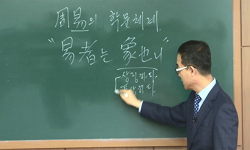본 논문은 간재 전우의 본성과 세계관의 관계를 중심으로 인물성동론을 검토하였다. 왜 세계관에 주목하는가? 우선 그것은 인물성동이논변의 성격에 관련되며, 다시 이것은 성리학적 세계...
http://chineseinput.net/에서 pinyin(병음)방식으로 중국어를 변환할 수 있습니다.
변환된 중국어를 복사하여 사용하시면 됩니다.
- 中文 을 입력하시려면 zhongwen을 입력하시고 space를누르시면됩니다.
- 北京 을 입력하시려면 beijing을 입력하시고 space를 누르시면 됩니다.

간재(艮齋) 전우(田愚)의 인물성동론(人物性同論) 고찰: 본성과 세계관 사이의 관계를 중심으로 = A Study on Jeon Wu’s Claim that Human Nature and Animal Nature is the Same: Focused on the Connection Between Nature and Worldview
한글로보기https://www.riss.kr/link?id=A108919265
-
저자
배제성 (성균관대학교 유교문화연구소)
- 발행기관
- 학술지명
- 권호사항
-
발행연도
2023
-
작성언어
Korean
-
주제어
전우 ; 인물성동이논변 ; 낙학 ; 태극 ; 기정진 ; 성리학적 세계관 ; Jeon Wu ; theory of human and animal nature ; Nak school ; the Great Ultimate ; Ki Jungjin ; worldview of Neo-Confucianism
-
등재정보
KCI등재
-
자료형태
학술저널
- 발행기관 URL
-
수록면
93-120(28쪽)
- 제공처
-
0
상세조회 -
0
다운로드
부가정보
국문 초록 (Abstract)
본 논문은 간재 전우의 본성과 세계관의 관계를 중심으로 인물성동론을 검토하였다. 왜 세계관에 주목하는가? 우선 그것은 인물성동이논변의 성격에 관련되며, 다시 이것은 성리학적 세계관이 위기에 봉착해 있던 당대의 상황과 공명하며 전우가 인물성동론에 주목할 이유를 새삼 환기시켰다. 본 논문에서는 이러한 측면들을 조망하기 위해서 기독교 선교사인 에른스트 파버의 태극 비판에 대한 전우의 반론, 화양서원 묘정비에 삽입되어 논란을 일으킨 송시열의 언급에 대한 전우의 논평, 수암 권상하의 인물성이론에 대한 전우의 반박, 그리고 조선 말기에 인물성동론과 이론의 지양을 표방한 기정진의 인물성론에 대한 전우의 비판 등을 함께 살펴보았다. 이런 몇 가지 측면들은 각각 근대화와 서구 문명의 침투에 대한 대응, 전통의 성리학 담론에 대한 해석의 우위 고수, 그리고 당대에 새롭게 주어진 이론적 대결에 대한 응전이라는 의미 등을 보여준다. 이러한 여러 측면에 대해 간재가 대응한 방식은 실질적으로는 낙학계 전통의 인물성동론에 대한 반복과 강조로 요약될 수 있다. 그럼에도 불구하고 우리는 이러한 몇 가지 측면들을 종합적으로 조망함으로써, 성리학적 세계관과 본성의 관련이라는 중요한 문제에 연관된 인물성동이론의 토대에 대한 이해를 환기할 수 있게 된다.
다국어 초록 (Multilingual Abstract)
This paper aims to review Jeon Wu’s Claim that Human Nature and Animal Nature are the same, focused on the connection between nature and world view. Why do we pay attention to ‘world view’? First of all, the issues of the debate of sameness or d...
This paper aims to review Jeon Wu’s Claim that Human Nature and Animal Nature are the same, focused on the connection between nature and world view. Why do we pay attention to ‘world view’? First of all, the issues of the debate of sameness or differences between human and animal nature are closely related to the world view, further, this feature of the debate resonated with the situation at the time when the Neo-Confucian world view was in crisis. As a result, Jeon Wu became more aware of the importance of the claim that human nature and animal nature are the same. To illuminate these aspects, this paper specifically examines three materials: Jeon Woo's refutation of Ernst Faber's criticism of the Great Ultimate(太極), Jeon Woo's refutation of Gwon Sangha’s claim that hat human nature and animal nature are different, Jeon Woo's refutation of Ki Jungjin’s theory of human and animal nature. Each of these aspects shows a response to modernization and the penetration of Western civilization, adherence to the superiority of interpretation of traditional Neo-Confucian discourse, and a response to a new theoretical confrontation given to the time. The way Jeon Wu responded to these aspects can be summed up as a repetition and emphasis on the theory of the Nak school(洛學) tradition to which he belongs. Nevertheless, by looking at these aspects comprehensively, we can evoke an understanding of the basis of the theory of human and animal nature, which is attributed to a fundamental matter of the relation between the Neo-Confucian world view and nature.
참고문헌 (Reference)
1 리쩌허우, "중국고대사상사론" 한길사 2005
2 陳來, "주희의 철학" 예문서원 2002
3 이경구, "조선, 철학의 왕국" 푸른역사 2018
4 정병련, "노사의 이일분수와 인물성동이론-"납량사의"를 중심으로" 한국동양철학회 6 : 1995
5 박학래, "蘆沙 奇正鎭의 人性物性論 - 理分圓融에 기초한 湖洛 兩論의 비판적 지양 -" 동양고전학회 (74) : 491-519, 2019
6 길태은, "艮齋의 人物性論 고찰 − 「中庸記疑」를 중심으로 −" 동양철학연구회 (104) : 27-54, 2020
7 楊祖漢 ; 千炳敦, "艮齋와 遂菴 權尙夏의 思想同異와 特徵" 간재학회 13 : 37-86, 2012
8 전병술, "艮齋와 南塘의 思想同異와 特徵 -「天命之謂性」장과 「生之謂性」장에 대한 이해를 중심으로-" 간재학회 13 : 145-168, 2012
9 "艮齋集"
10 "經義記聞錄"
1 리쩌허우, "중국고대사상사론" 한길사 2005
2 陳來, "주희의 철학" 예문서원 2002
3 이경구, "조선, 철학의 왕국" 푸른역사 2018
4 정병련, "노사의 이일분수와 인물성동이론-"납량사의"를 중심으로" 한국동양철학회 6 : 1995
5 박학래, "蘆沙 奇正鎭의 人性物性論 - 理分圓融에 기초한 湖洛 兩論의 비판적 지양 -" 동양고전학회 (74) : 491-519, 2019
6 길태은, "艮齋의 人物性論 고찰 − 「中庸記疑」를 중심으로 −" 동양철학연구회 (104) : 27-54, 2020
7 楊祖漢 ; 千炳敦, "艮齋와 遂菴 權尙夏의 思想同異와 特徵" 간재학회 13 : 37-86, 2012
8 전병술, "艮齋와 南塘의 思想同異와 特徵 -「天命之謂性」장과 「生之謂性」장에 대한 이해를 중심으로-" 간재학회 13 : 145-168, 2012
9 "艮齋集"
10 "經義記聞錄"
11 "巍巖遺稿"
12 "寒水齋集"
13 "宋子大全"
14 "南塘集"
15 "中庸章句"
동일학술지(권/호) 다른 논문
-
제후들의 천명: 춘추시대 증나라 청동기 명문을 중심으로
- 한국유교학회
- 성시훈
- 2023
- KCI등재
-
- 한국유교학회
- 조장연
- 2023
- KCI등재
-
K-MOOC를 통한 ‘한국의 전통문화’ 확산 방안 - ‘K-예술’ 분야를 중심으로 -
- 한국유교학회
- 김용재
- 2023
- KCI등재
-
탈주자학을 꿈꾼 학자들의 『중용』 장절(章節) 체계에 관한 연구 Ⅱ - 정제두의 『중용』 장절(章節) 체계를 중심으로 -
- 한국유교학회
- 황인옥
- 2023
- KCI등재




 KCI
KCI KISS
KISS


